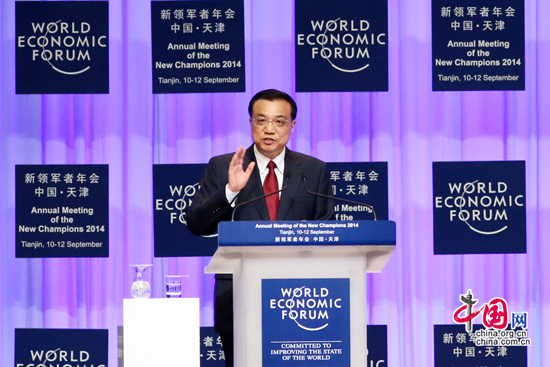李克強在第八屆夏季達沃斯論壇上的致辭(全文)
Full text: Li Keqiang's speech at Summer Davos opening ceremony
| 2014年9月10日,天津,國務院總理李克強出席世界經濟論壇第八屆新領軍者年會(2014年夏季達沃斯論壇)開幕式并致詞。[中國網 楊佳 攝] Chinese Premier Li Keqiang delivers a keynote speech at the opening of the Annual Meeting of the New Champions 2014, also known as the Summer Davos forum, in Tianjin Municipality, north China, Sept. 10, 2014. [Yang Jia/China.org.cn] |
| 緊緊依靠改革創新 增強經濟發展新動力 ——在第八屆夏季達沃斯論壇上的致辭 李克強 (2014年9月10日) |
Creating New Dynamism Through Reform and Innovation Address at the World Economic Forum Annual Meeting of the New Champions 2014 By Premier Li Keqiang 10 September 2014 |
| 尊敬的施瓦布先生,尊敬的各國元首和政府首腦,尊敬的各位來賓,女士們,先生們,朋友們: | Dear Professor Klaus Schwab, Your Excellencies Heads of State and Government, Distinguished Guests, Ladies and Gentlemen, Dear Friends, |
| 很高興和大家相聚中國天津,共同出席第八屆夏季達沃斯論壇。我謹代表中國政府對論壇召開表示熱烈祝賀!對各位遠道而來的嘉賓表示誠摯歡迎! | It gives me great pleasure to meet you here in Tianjin at the eighth Annual Meeting of the New Champions, or the Summer Davos Forum. On behalf of the Chinese government, I wish to extend warm congratulations on the opening of the Forum and a cordial welcome to all of you who have come from afar. |
| 本屆論壇以“推動創新,創造價值”為主題,具有很強的現實意義。創新是人類社會的永恒話題,也是經濟社會發展的不熄引擎。世界經濟穩定復蘇要靠創新,中國經濟提質增效升級也要靠創新。近幾年,中國經濟之所以能夠保持持續發展,向著健康方向前進,主要動力還是來自于改革創新。 | The theme for this year's Forum, namely "Creating Value Through Innovation", is a most relevant one. Innovation is an eternal topic of the human society and an inexhaustible engine driving economic and social development. Innovation is vital to the steady recovery of the world economy. Innovation is also essential to upgrading the Chinese economy and improving its performance. And it is thanks to reform and innovation that the Chinese economy has in recent years maintained steady and sound growth. |
| 今年以來,世界經濟形勢錯綜復雜,發達國家經濟復蘇艱難曲折,新興市場國家經濟增速放緩,中國經濟下行壓力加大。我們堅持穩中求進的工作總基調,保持定力,主動作為,不搞強刺激,沒有放松銀根,而是強力推進改革,大力調整結構,著力改善民生,保持了經濟平穩運行。上半年,中國經濟增長7.4%,居民消費價格漲幅為2.3%。在經濟增速放緩的情況下,1-8月,31個大中城市調查失業率保持在5%左右,城鎮新增就業970多萬人,與去年同期相比多增了10多萬人。 | The global economic environment has remained an intricate one since the beginning of this year. The road to recovery in developed countries has remained bumpy. Growth in emerging market economies has slowed down, and the Chinese economy faces greater downward pressure. Facing this challenging environment, we have continued to follow the general principle of making progress while maintaining stability. We have stayed the course and pursued a proactive approach. Instead of adopting strong economic stimulus or easing monetary policy, we have vigorously promoted reform and economic readjustment, and made efforts to improve people's lives. As a result, we have maintained steady economic performance. In the first half of the year, the Chinese economy registered a 7.4 percent growth, and CPI rise was kept at 2.3 percent. Despite economic slowdown, between January and August, the surveyed unemployment rate was kept at around 5 percent in 31 big and medium-sized cities. More than 9.7 million urban jobs were created, which is over one hundred thousand more compared with the same period last year. |
| 經濟下行壓力加大,但就業不降反增,主要是改革發了力。本屆政府成立以來,我們大力推進行政審批制度改革,各部門已取消和下放了600多項行政審批事項,今年又在全國推行商事制度等改革,企業準入的門檻低了,“緊箍咒”松了,極大地調動了全社會創業興業的熱情。1-8月,新登記注冊市場主體800多萬戶,其中3-8月工商登記制度改革后新登記注冊企業同比增長61%,出現“井噴式”增長,帶動1000萬人以上就業。我們不僅推進商事制度改革,而且推進投融資、稅收、流通等體制改革,進一步打開了服務業等新興產業發展的閘門,對擴大就業起到重要的“推進器”、“容納器”作用。 | Despite growing downward pressure on the economy, more jobs were created, thanks to new steps of reform taken. Since the beginning of this government, we have advanced the reform of the administrative review and approval system. Government departments have removed or delegated to lower levels administrative approval on over 600 items, and this year, the business registration reform, among others, has been carried out nationwide. This has lowered the threshold for starting businesses and removed restrictions on them, thus giving a great boost to business development in the whole country. Between January and August, the amount of newly registered market entities was more than eight million, and from March to August, with the business registration reform, the number of newly registered businesses grew by 61 percent over the previous year, all pointing to a massive upsurge which has generated more than 10 million jobs. In addition to reforming the business registration system, we have also introduced reforms to investment financing, taxation and logistics systems, and further opened the gate for the development of the service sector and other emerging industries. All these measures have been vital in fostering and increasing job opportunities. |
| 中國經濟的積極變化,不僅表現在就業增加和居民收入增長上,也體現在結構優化上。簡政放權加上“定向減稅”、“定向降準”等財稅金融措施,有力地支持了服務業、“三農”、小微企業、民營企業和新興業態的發展。上半年,物流快遞、電子商務等新產業、新商業模式迅速成長;新登記注冊服務業企業增幅達70%以上,第三產業增速和比重繼續超過第二產業,在國民經濟中處于領先地位;民間投資占固定資產投資比重同比提高1.4個百分點;高技術產業和裝備制造業增長均快于工業整體增長。 | The positive changes in China's economy are not only reflected in the increase of jobs and residents' incomes, but also in the structural upgrading. We have streamlined administration, delegated powers to the lower levels, and adopted fiscal, taxation and financial measures such as targeted tax reduction and targeted reduction of required bank reserve ratio. All these measures have spurred the growth of the service sector, agriculture, rural area and the welfare of farmers, as well as small and micro-businesses, private businesses and emerging industries. In the first half of the year, new businesses and new business models such as logistics, express delivery and e-commerce all developed fast. The number of newly registered service businesses surged by more than 70 percent. The tertiary industry continued to outperform the secondary industry in terms of growth rate and share of GDP, and is a leading sector of the economy. The share of private investment in fixed asset investment increased by 1.4 percentage points year on year. High-tech industries and equipment manufacturing grew faster than the industrial average. |
| 結構調整深入推進,提高了經濟增長質量。我們以改革創新為動力,一手抓壓減過剩產能,尤其是淘汰落后產能,一手抓培育新的增長點。上半年,高耗能、高排放行業投資和生產增速明顯放慢。單位GDP能耗同比下降4.2%,碳排放強度下降5%左右,是多年來降幅最大的。 | Deepening structural readjustment has improved the quality of economic growth. On the basis of carrying out reform and innovation, we have reduced overcapacity, eliminating outdated capacity in particular, and fostered new growth areas. In the first half of the year, the growth of investment and production of industries with high energy consumption and emissions noticeably slowed down. The per unit GDP energy consumption dropped by 4.2 percent year on year, and carbon intensity was cut by about 5 percent, the largest drop in many years. |
Go to Forum >>0 Comment(s)
No comments.
 0
0 







